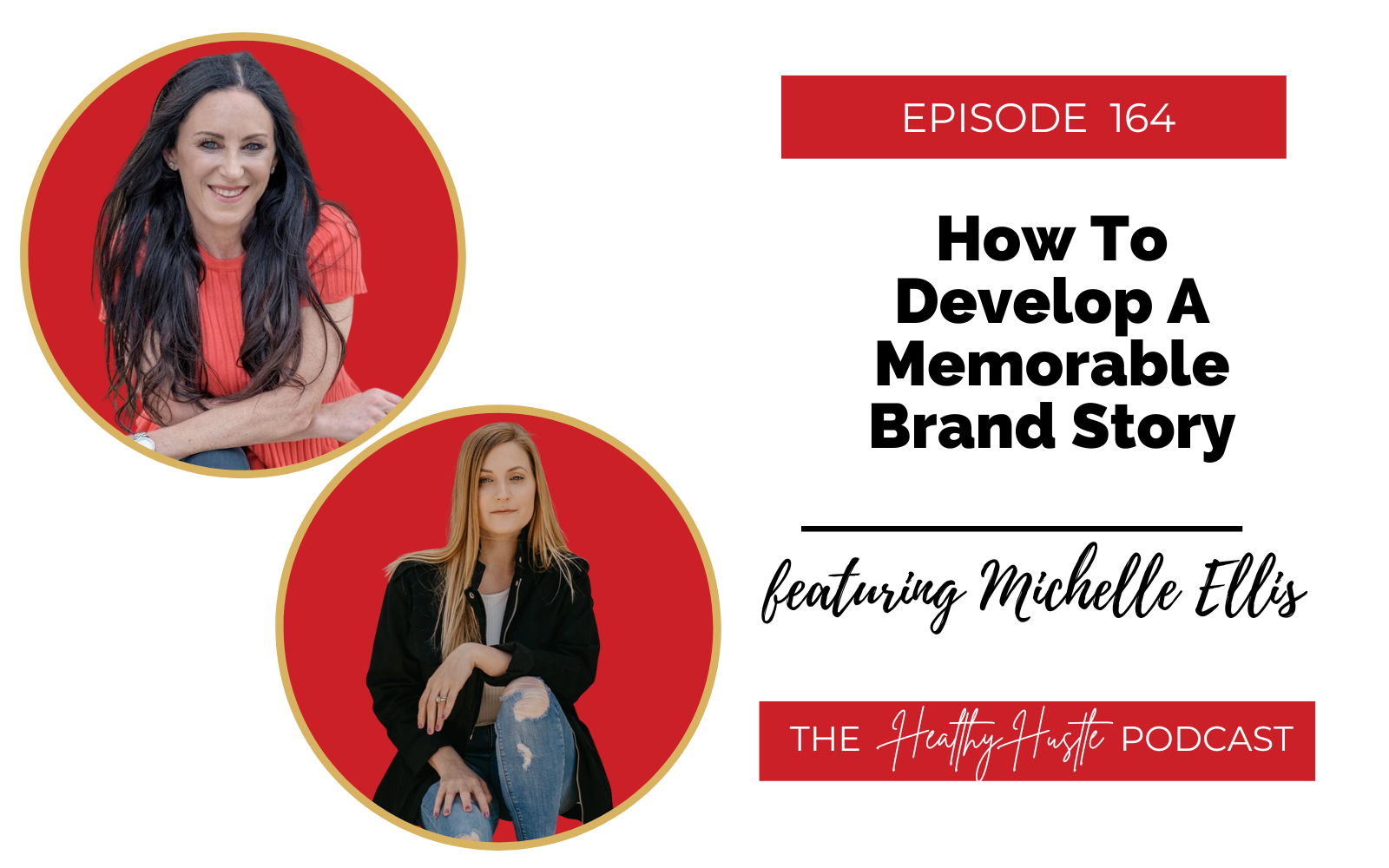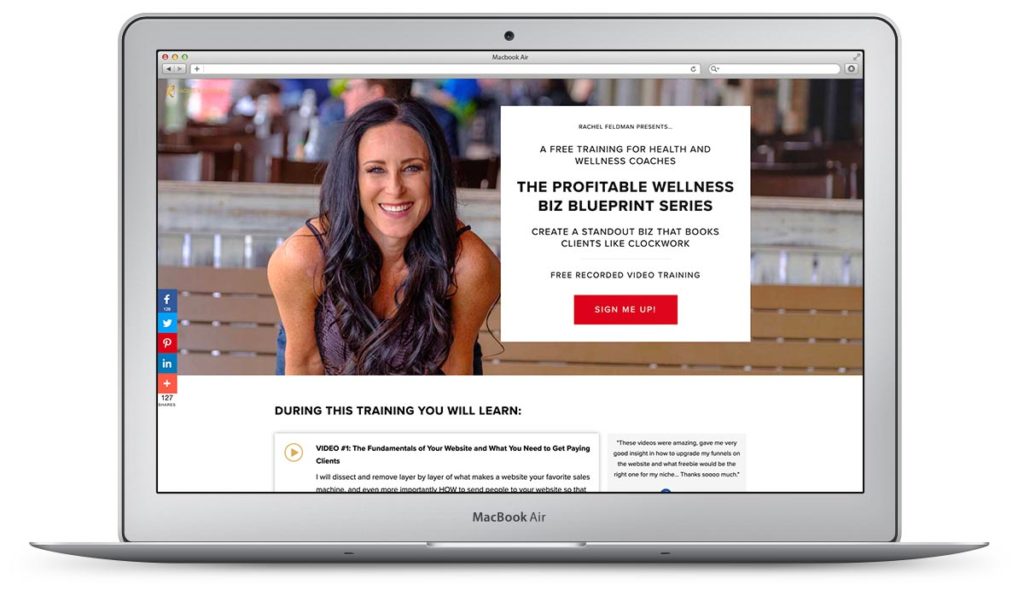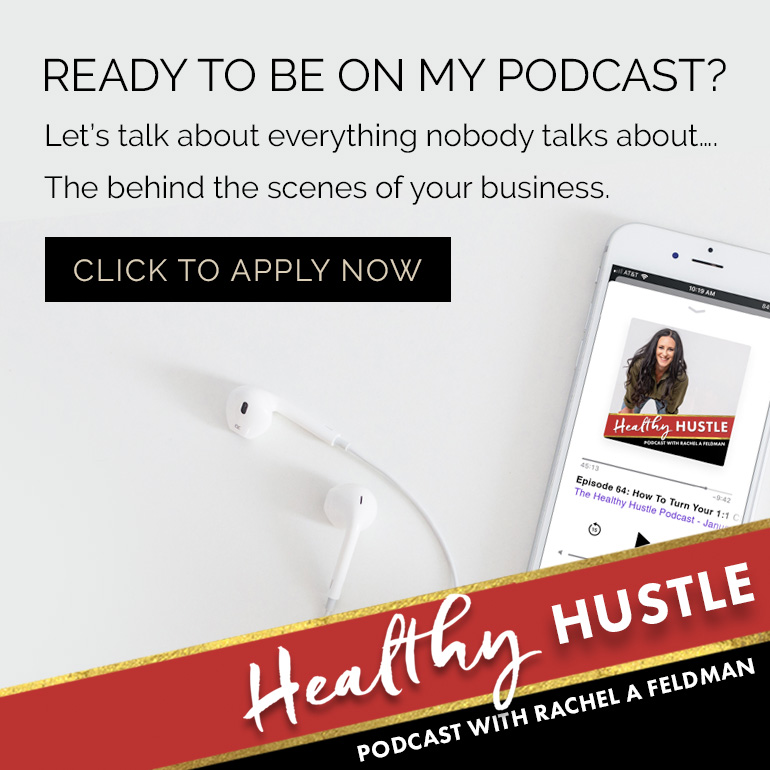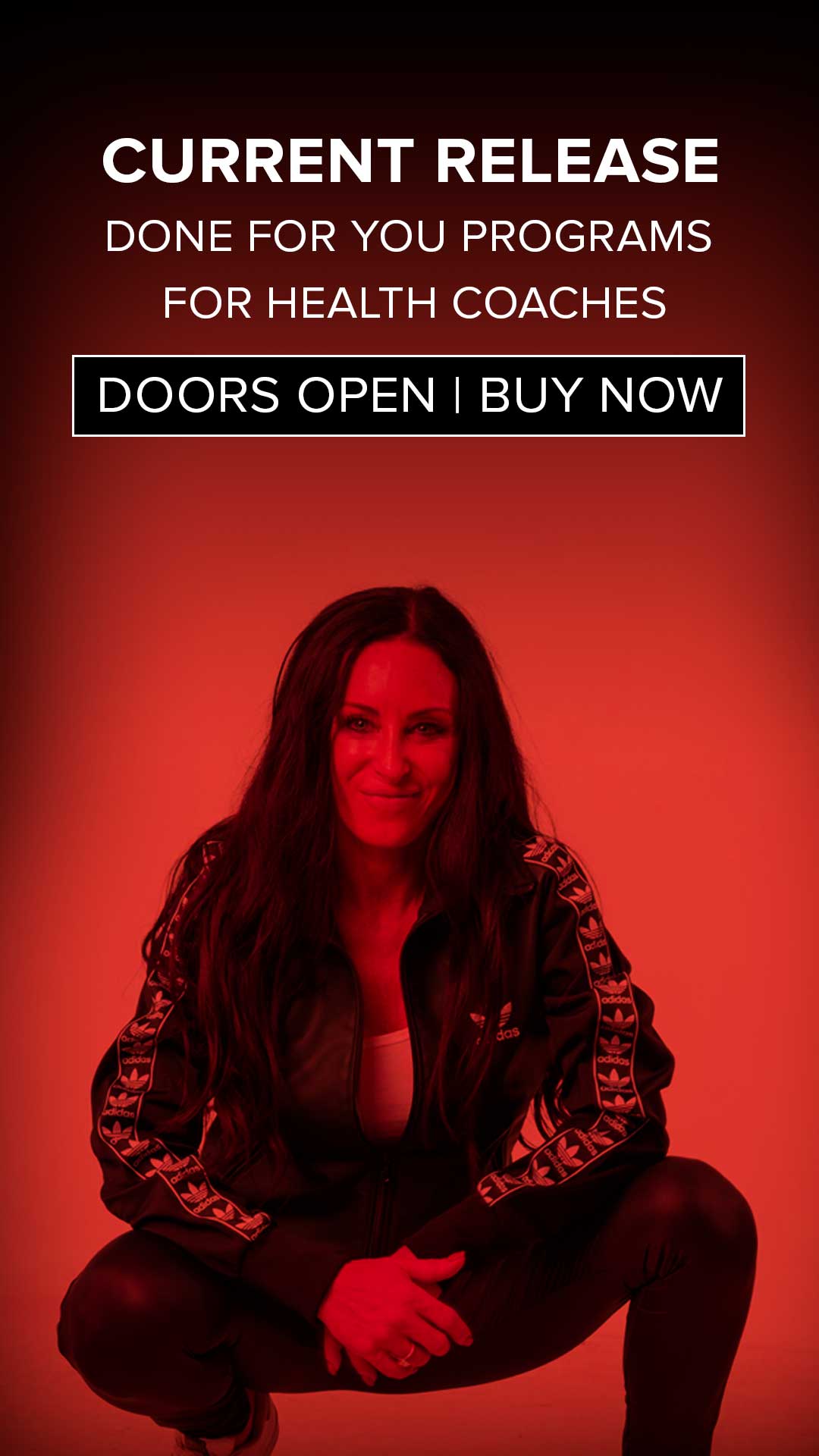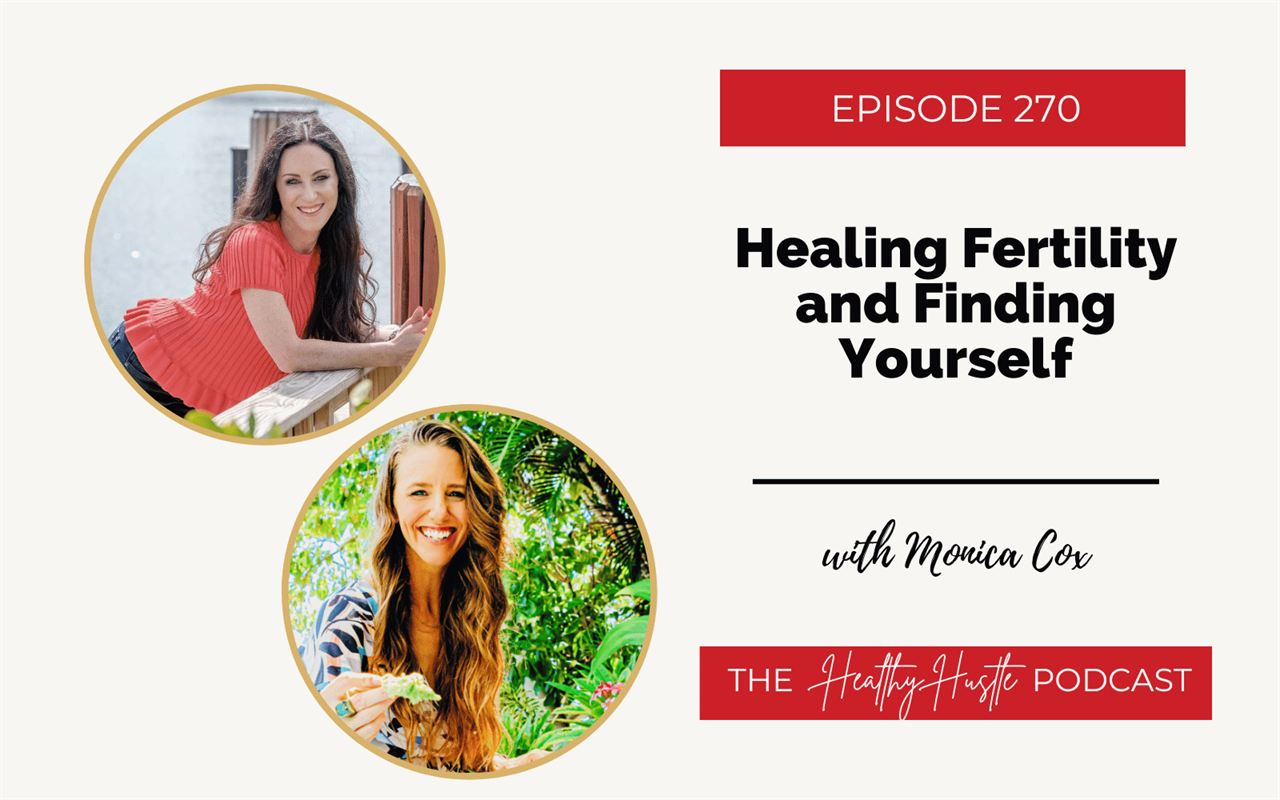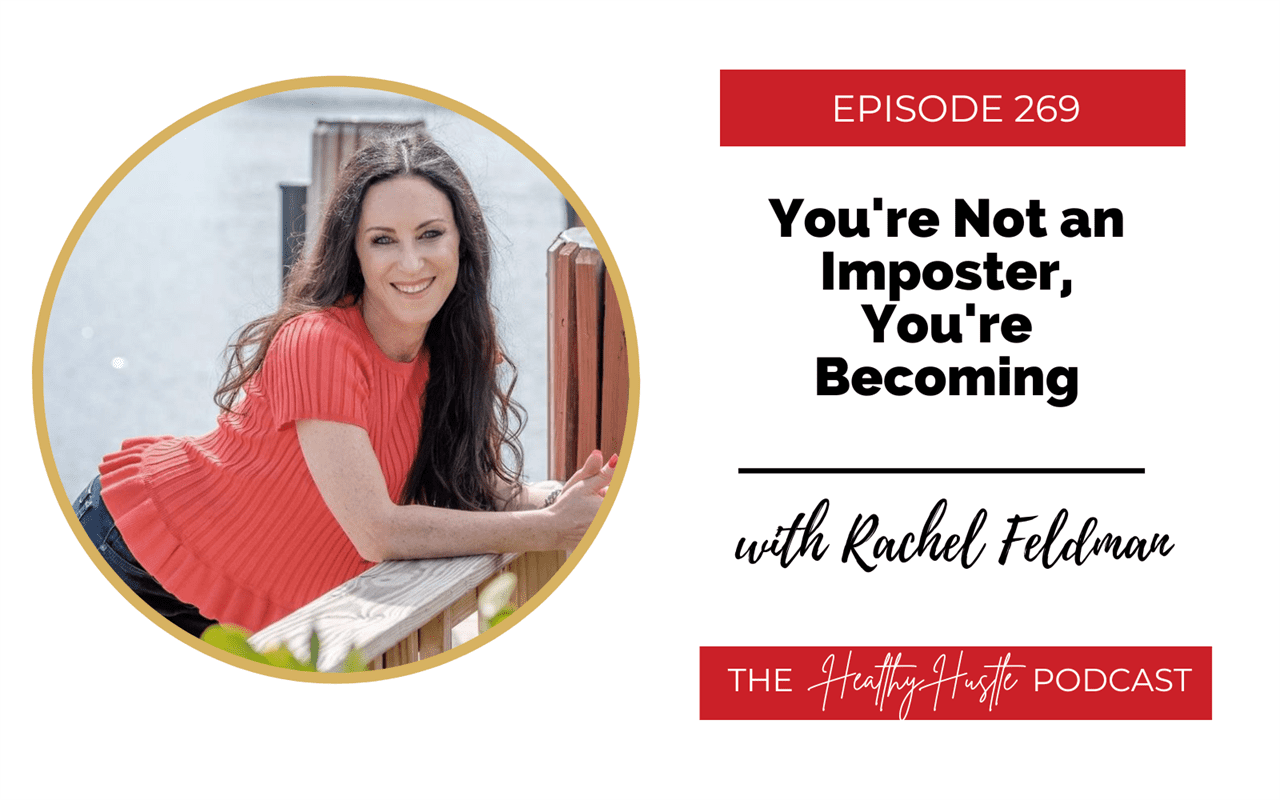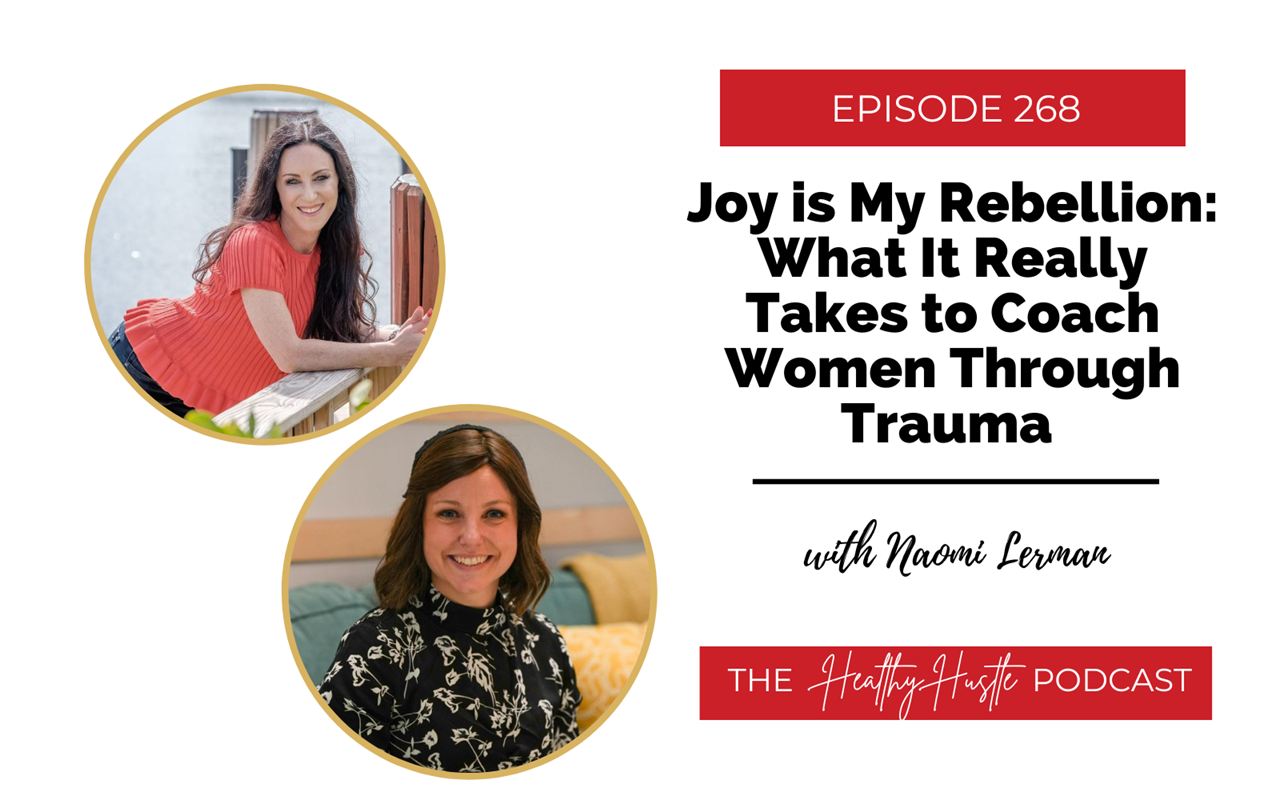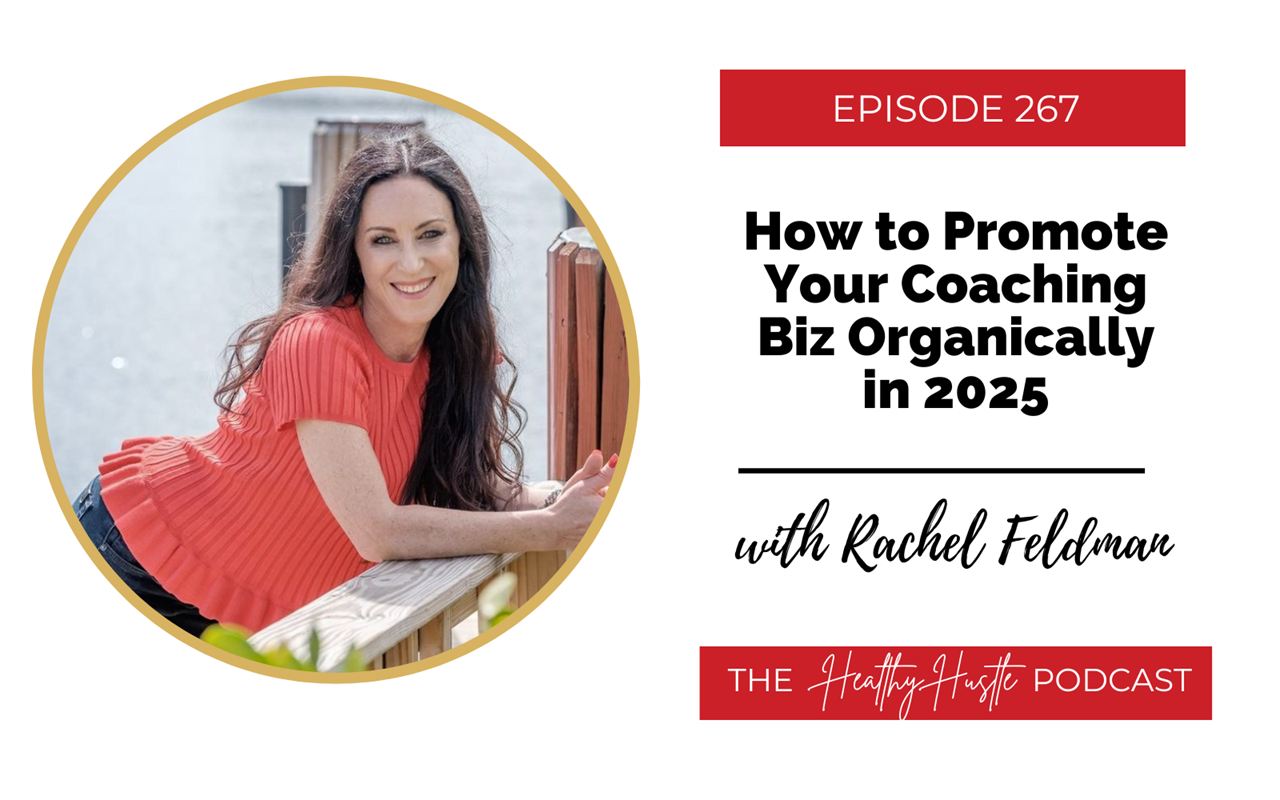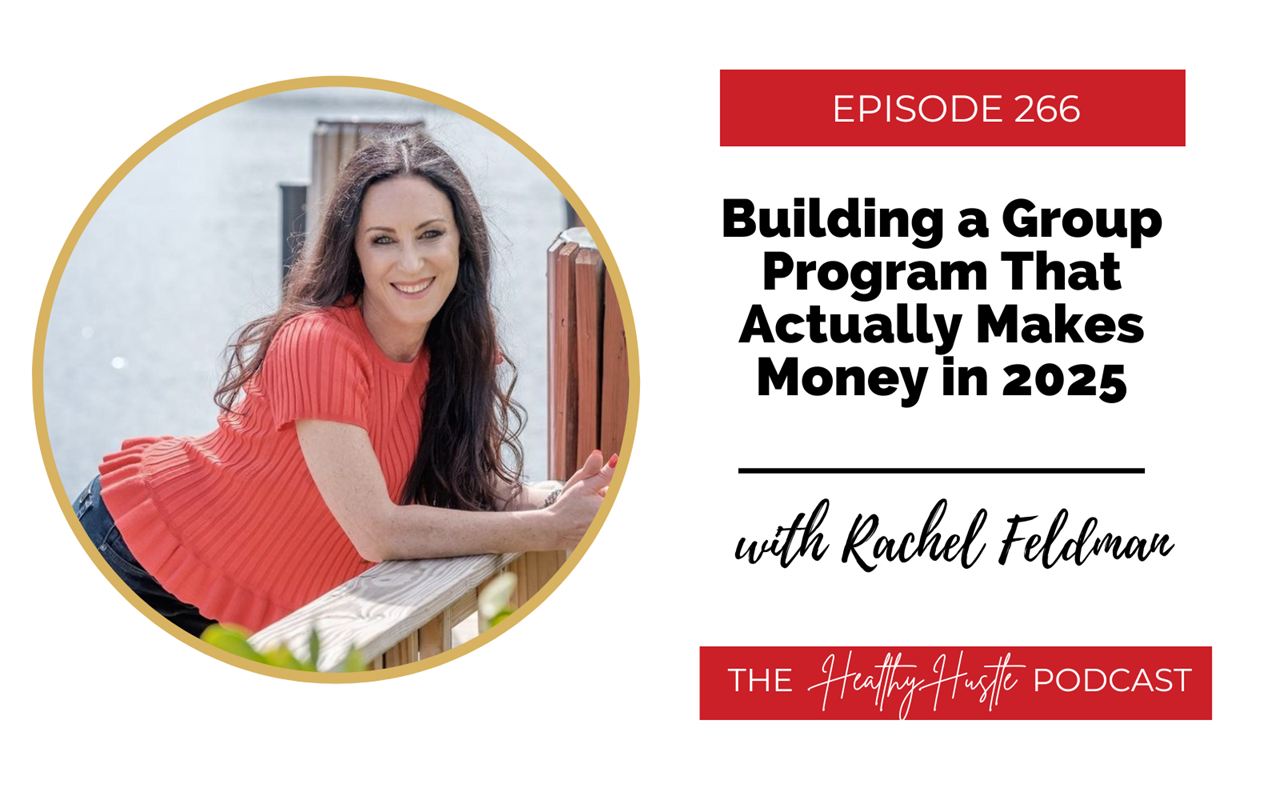Have you ever struggled with writing your story or figuring out what to say in emails, webinars, blog posts, or social media? A brand story is key if you want to connect and identify with your ideal clients. As a health coach, your ideal clients want to know how you can help them and how you got to where you are today. But how do you develop a memorable brand story and messaging around it?
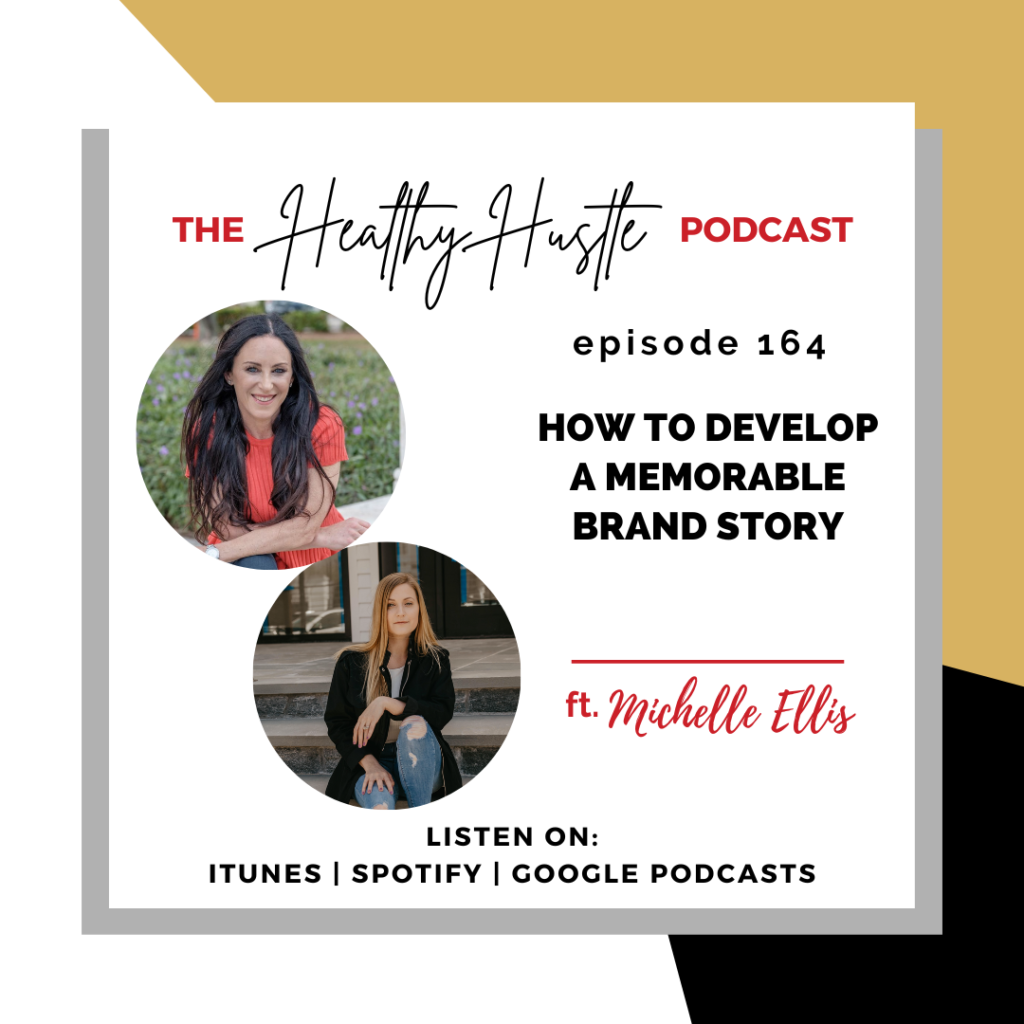
In this episode, Michelle is back on the Healthy Hustle Podcast to talk all about brand story and messaging. More specifically, what a brand story is, how to map yours out, what a micro story is, the difference between oversharing and sharing a solution within your story, how to overcome writer’s block, and so much more.
If you’re ready for all the tips, tricks, and insights that will help you put a memorable brand story together, this episode is for you!
Connect with Michelle:
Michelle’s website: https://michelleellisco.showit.site/#/
Michelle’s Instagram: https://www.instagram.com/theorganiccopywriter/
Rachel: Hey guys, we’re talking brand story and messaging. If you have been sitting there and saying I’m struggling to write my story, I’m struggling to figure out what to say in emails, blog posts, or social media. This episode is for you.
I have Michelle, here copywriter and past health coach to talk with me about this amazing topic. Michelle, tell me, what is a brand story?
What Is A Brand Story?
Michelle: A brand story is really that background history of your main story. When you go to any website for any business and wonder, how did this company get started? Who are the founders? What is it all about? That’s a brandstory.
When it comes to health coaching, you really want to know, how can that person help me? Were they able to help themselves? How did they help themselves? That becomes your brand story.
You started this health coaching business because you had this thing happen to you that you were able to fix. Now you’re on a mission to help others fix the same problem and being really vulnerable with that, and honesty is super important.
Rachel: When you’re developing a brand story, are there certain steps that a coach can take to map out this story?
How To Map Out Your Brand Story
Michelle: Definitely. What happened? What did you have wrong with you? Let’s say you have an autoimmune condition, did you struggle with weight gain? What were your periods like? How did it feel? That’s one of the most important things.
It’s not just like, oh, yeah, I had this problem. How did that problem make you feel? How did it affect your daily life? What did you try? Because everyone tries 1,000,001 things to try to fix that problem that usually don’t work. So what did you try? What was the thing that saved that entire situation and got rid of that problem that got you to where you are and coach others to do the same?
Rachel: I love that you brought up, what did you try? Because I think in those stories that you tell on a webinar or in a workshop or a blog or social media or emails, these are the things that your ideal clients can identify with. When they hear what you tried, something they are familiar with or that they may or may not have tried, that’s when people say, “Oh, they tried all these different things.” You may hit a chord with that ideal client and have them really identify with you.
Michelle: Especially if it’s those common things of certain diets, going to the gym, or being careful with your wording. But if it’s conventional types of prescriptions or whatever, to balance blood sugar things that.
My origin story or my beginning story is about when I got my first ulcer at 14. I came out of the hospital at 14 and a half and they put me right on Prilosec. I had constipation as well and they put me on Miralax. All these things that would try to un-constipate me. When I say those things, those are definitely things that people can identify with.
Rachel: Absolutely, because there are also very common protocols that they still give out today that may or may not work for someone and they’re definitely not holistic and may not get to that root cause, which is why we then see health issues that get worse and worse.
What are the parameters around your Brandstory and subsequent timeline?
When we’re developing this brand story. Would you say it’s almost a recap of what happened? What was life like? What brought you to your knees? What did you try when you realized you had to go and figure this out on your own? Where did you go to school? What do you do now?
Michelle: Exactly. On very, very rare occasions, it’s happened as a copywriter, where someone’s like, Well, I don’t have that type of a story. Usually, if it’s not yourself it’s happened to, it’s either something you’ve seen, something you grew up witnessing, maybe an unhealthy household food wise, or maybe you became this health coach to provide a different healthier lifestyle for your own children.
There’s always some type of frustration somewhere along the way. It’s something that you wanted to change.
It’s the whole core of, what is your mission? Why are you doing this? When you start sharing that with other people, that’s what’s going to connect them to you and your health coaching business.
What Microstories Are & How To Develop Them
Rachel: So we have a brand story, and then we have these other micro stories. Can you talk a little about what micro stories are?
Michelle: So there’s the big overarching core story. But that can seem very repetitive, right? You can’t post that on social media every single day. It lives on your website, you share it in workshops at the beginning, or when you’re introducing yourself.
But once people are warmed to you, and they become your warm market, and they know who you are, they’ve heard that story. They don’t want to keep hearing it 1,000,001 times over. So you really have to also share these little micro stories.
You can create a list or a storyboard or something of these other little moments where you had amazing realizations, or you go back to that timeframe of let’s say, you were battling something for five years, the problem. Think back and create –don’t make it up– but go back, revisit that time and think of 20 stories, little micro moments in time, where you were going to make a decision, and then this happened, or you felt a certain way at a certain place, and then this occurred You can talk about now versus then and how six years ago and what what you wish you would have known.
Those are the kinds of little stories you can use. About how now you make different decisions and you handle things differently, talking about relevant stuff. You can then drip that into your marketing or when you’re talking.
If you’re coaching clients, what are some of their stories that you can be sharing that are still micro-stories that relate to the problem and the solution? So really coming up with those moments to be able to share those so it’s still story-driven, which really connects with people. But it’s not this big repetitive story, reading the same book 20 times over.
Rachel: This reminds me of Reed Davis, who owns FDN. When I interview him, he always says, “I never had a health issue.” I just was so disgusted by what I was seeing that I wanted to go into the health industry. He’s like, I want people to have energy so they can do whatever they want in the day and never feel exhausted.
I think when you’re developing your story, if you didn’t have one, you’re still kind of frustrated with something that should be working in the world. And you want that change.
Michelle: Yeah, and that’s a huge deal. I think that just gives a nice backbone to any company, and makes people connect with that because we all want to be a part of each other’s mission in some community way. So it’s nice to know that the person cares.
That’s the biggest problem. Whether you had the problem yourself, and you solved it, or you care about that problem so much you want to fix it, it still is super important to share.
Why Building A Rock-Solid Brand Story Is Essential For Messaging
Rachel: Tell me why developing a really rock solid brand story is essential for messaging, which really, the messaging is to get that potential client to hire you. So let’s talk about this. Because I feel this is the part where I see a lot of disconnect. I see a lot of coaches who are clear on their niche. They have great content, but the content is not converting.
What about that is maybe you’re not clear on where your ideal client actually is? Maybe you’re using verbiage and words that are above the head of what your client actually thinks for their own health conditions.
Michelle: Some of the mistakes I see, especially with copy, is this. All health coaches are very genius. They have a wealth of knowledge. But always remember, your ideal clients don’t have that knowledge. They don’t even know what to do next to take the next step. So if you talk to them from that professor-student type of vibe, there is going to be a big disconnect.
They need to be spoken to like a regular person in a coffee shop that you sat down next to. Something that’s really easy to understand. It’s not this difficult thing.
The other side to that is sometimes coaches rest in that. They say, Okay, this is great content, I can put all this education out, then they don’t share their story. They don’t merge their story.
The Disconnect Between Educating Without Using Micro Stories
Rachel: I’m thinking of this one coach who was talking about gut health, leaky gut, liver health. But I didn’t see as much coming from those micro-stories enough for that client to identify and say, Oh, wow, maybe I have gut issues, I’ve got skin issues, I’ve got weight gain, I’ve got issues got bags under my eyes, my hair’s falling out, all the things that most people struggle and deal with. I see that not connecting enough to those stories to help them identify a lot of information. Information that I think is great, but it’s not getting that person to sign up.
Michelle: Yeah, it’s usually lacking emotion, it’s lacking the story. It’s usually out of fear and sometimes that even comes from not being fully healed of that problem yourself. I think we need to normalize that you don’t have to be fully healed, you can be 50% of the way ahead of your client. It might be a condition that isn’t even fixable. It’s just manageable. And that’s okay too. Teach better habits, how to manage this diagnosis. So I think just feeling comfortable with that you don’t have that perfectionism. You don’t have to have the perfect story to share something.
The Difference Between Oversharing & Sharing A Solution Within A Story
Rachel: I love when you said, sometimes we feel we don’t have a story. Let’s talk about what is too much to share? Because when we talk about a story, I start to think, Oh, my God, I’m going to share this time and this time and this time, but I always say don’t share without a solution. I think that sometimes when people overshare, they think it’s going to attract their ideal client, but they’re not sharing the solution in that story.
Michelle: That usually comes from when coaches think of their whole journey, from A to Z. They get out of that, what was the one moment where everything changed? So there’s this whole big long backstory of when I was five, this happened, and that impacted this. And then when I was 7 and 10, and 12, and 14.
You have to find that balance between what’s too much information and what’s irrelevant? Literally wipe out what’s irrelevant. Some things are just completely irrelevant and have nothing to do with the problem or the solution. So they don’t really need to be shared, at least on your website. Maybe in conversation one day at a time. But it’s not really necessary unless it really did impact your health, and was a really major contribution to the problem.
So really looking at things through the lens of did this contribute majorly to my health problem? And if not, it should probably not be included.
Strategies To Help You Nail Your Messaging
Rachel: Let’s dive into messaging. What are strategies that a coach who maybe feels they are horrible at messaging or they get writer’s block the moment they sit down to write something can use?
Michelle: Honestly, the easiest way out of that is to record yourself either on audio or video, and just talk through it. I think sometimes what can happen if you pressure yourself and feel you have to sell something or sound a certain way, you might be looking at it like, oh, I have to make sure this leads to my coaching package or program or something.
But really, just be in that moment of the story and just tell it to your audience the same way you would a best friend or someone who doesn’t know something about you. It doesn’t have to even be grammatically correct when it goes on your website. People really truly connect with the story, the emotion, the meaning behind it. I think every person is capable of doing that.
Sometimes if you get into that mindset of, oh, I don’t think I’m a good writer. Well, do you have good conversations with people? Can you open up? If you really, truly can’t, then share it with a friend or a peer health coach and then work on it together. There’s always a way around it.
How To Get Your Messaging On Track & Connect With Your Ideal Clients
Rachel: I think that’s a perfect solution for that Coach who has nailed their niche, but their messaging is off. We kind of touched on this a little earlier. But what would you say, if a coach is not attracting that client, they’re not getting people on Discovery calls, they’re not converting people to their freebies, what would you say is step one to look at?
Michelle: Step one would be to really look at, column by column, who is your ideal client? What are their painful moments? What are their current struggles? What are they still dealing with? What do they want to solve?
And then put your storyline kind of side by side and ask yourself, did you cover those bases? When you were writing your own story, did you relate to how that made them feel? And how are they still feeling? How it affected their daily life, the things they’ve tried, and how they feel right now? How would it feel for them to not have to deal with what they’re dealing with right now? Talking about that, I think is the biggest thing and just showing up comfortably in it, in authenticity, and not feeling a lack of confidence or allowing that to show through.
I think sometimes our own attitude on how we deliver our message can really impact how it’s received. So really trying to show up with confidence when you share it.
Rachel: That’s such a good point. Because we talk all the time about showing up and sharing our story whether it’s in the beginning of a webinar, or it’s a workshop, or you’re doing it in social media, and I think that lack of confidence and that fear to show up can sometimes give us writer’s block. So make that message clear to that ideal client. Don’t get stuck in static messaging where you don’t even infuse our own story. Then it doesn’t seem personal.
How To Overcome Writer’s Block Around Your Brandstory
Michelle: I can honestly say from the copywriting perspective over the years, I’ve had to step into a lot of shoes, a lot of voices, sometimes they’ve been super easy, and sometimes they haven’t been. That’s when I’ve personally faced writer’s block, like the shoes don’t fit or something.
Always remember that it’s your story. They’re your own shoes. You’re filling them. You’re walking in them, you’re not trying to put on another pair, so you can write in a way that’s just honest and you and no one else truly can do that. Even as a writer, I really do believe that no one can do it better than you.
We can finesse it up and make it sound super cool and marketable and all those cool things. But the heart of it, there’s always something there that only you can express, only you’ve experienced, only you can share. So get that draft down first, because that’s even a foundation that even if you have someone help you polish it up or something people need that.
If your goal is to be able to work with a copywriter, take the exercise where you write down, what was your story? What was it like? What did you find out going through that process? Where do you go to school? Who do you help? Really being able to write down that story and then pull different micro memories, micro events so that when you’re working with a copywriter, or even a social media manager, those stories have to be there. Otherwise, it just becomes more information, and you’re not going to stand out from the crowd.
The Importance Of Having That Core Brandstory
Rachel: Exactly. And that’s what really differentiates you from 100 health coaches out there. If people are viewing that in their feed, what makes us so different is you have your story there. Otherwise, it’s all the same.
Now, I know you do a lot of Facebook advertising writing. Would you say those kinds of Facebook ads do really well when they’re coming from that personal story?
Michelle: Always. Especially and that’s where that shift comes in. if you’re going out there in front of a cold audience, they’ve never met you before, you have to have that core story. That story that lives on your website, it’s in all your guides out there, your list builders. When you warm them up, and they become your warm market, you need something else to pull you need those micro-stories you need those moments, those day-to-day things that still happen in your company experiences, to be able to still relate to that audience.
Rachel: Love that. I think this episode has been amazing when it comes to brand stories, because a lot of us don’t share as much as we should. We wonder why our ideal clients are not hiring us, but we’ve just been given out a lot of information and facts. And when we stop that, and we combine that with a really powerful story, people identify.
Michelle: And they trust. They can trust you and then they also trust the authority that you’ve been putting out with the informational content. Then it’s like, okay, this person cares. They know what they’re talking about.
Getting Comfortable With Sharing Your Story
You also want to have that connection, so that they can be vulnerable with you. You want to hire a health coach that you can feel comfortable sharing your problems with too. This story also comes into play so much in the discovery session, because one of the things that I always made sure of in discovery sessions is that we were talking like good friends. I was open to that person and shared trials and tribulations, things that had been a problem, things that are still a problem and talking about how it doesn’t run my life.
When our clients come to us, that problem is running their life. That’s where we’ve come out of. So being able to have those conversations when we’re sitting in the beginning of a workshop or a webinar, on a discovery call, even having those conversations when you’re out at a party or networking event. You need to be able to say that to somebody and be comfortable.
Rachel: I love how you said to record yourself. Because practicing how you position yourself with your story is a really pivotal change, it has to be a pivotal change in everyone’s business.
Michelle: Yeah. And that takes a lot of vulnerability. So it’s really giving yourself the grace to feel into that. But be vulnerable. Don’t be afraid to share what you’ve gone through and how far you’ve come, no matter how far it is, I think is really important.
The last part is to remember, people are new. People are always coming into your funnel. Those other stories are great for the people who already know you. But remember, you don’t know who’s coming to your social media page, you don’t know who’s reading your content. There’s always new people coming in. So you need to kind of go back to that origin story, driven front micro stories and be able to have that person really identify with you.
And speaking up, I love one of the posts that you always do, periodically It’s hey, I’m Rachel, I’m here. It’s been a while I’m going to reintroduce myself. Cycle that into your social media is great because it gives people an opportunity to meet you. Maybe they are brand new. So I think it’s really good to do something and say a few other things that don’t get mentioned as much.
The big thing about social media is we love to stalk somebody’s life. When you have those extra tidbits like, I’m an Aries, I’m originally from Philly, I moved to Florida, my dog is X. All of all the things that are fun for that person who does know you. And they get to actually find out new things. But then a nice reintroduction post for somebody who is brand new too, who doesn’t exactly know what you do.
Rachel: That’s such a great tip. Put your brand story together. Make sure that you do your homework where you even do side by side exactly as Michelle said, what were some of the things you dealt with? How did you get over them? What do you do now? Do you still have obstacles in life? There are a lot of different categories that you can write in and do those columns so that you have the stories for yourself, for your social media, your messaging, and especially if you work with a copywriter. Plus, if you work with a coach, they’re going to want these stories as well. They’re going to want you to be able to tap into the stories so that you do have success and that you’re able to attract your ideal client.

